Musings on Causality and Systems Thinking
How does one define "root cause"? or is that even the right question?

In my last post, I talked about the underlying reasons for the Ukraine war. After writing it, I was still conflicted with the determination of causality for the position of: "NATO expansion caused the Ukraine War". To recap the argument, the first order cause of the war is that Putin felt threatened. The second order cause is the expansion of NATO, which some would say is the "root cause".
According to this theory, the fault of the war in Ukraine rests squarely at the feet of the US. But that got me thinking... the cause of the US allowing new countries into NATO was the country's desire to join NATO in the first place. So now we have three separate causes.
This is important because depending on which cause we determine to be the "root cause", it shifts the blame about who is at fault for the war. If the 2nd order cause is the root cause, then the US is to blame, if it’s the 3rd order cause, then it’s the former Soviet countries fault. So there you have it, the fault of the invasion of Ukraine lies at the feet of Lithuania, Latvia, Estonia, and… Ukraine? Wait, that can't be right. Let's go down another layer.
Ok, this narrative is better. Russia's lack of natural borders has historically caused it to be extremely aggressive towards its neighbors, causing these neighbors to apply to NATO, causing the US to let them in, causing Putin to be threatened, causing the invasion of Ukraine. So it’s Russia's fault!
But wait, we can just add a 5th order cause as “no natural barriers”, which in turn causes Russia’s historical…you get the point. Do you see the issue? We can just look at the causal chain of events leading up to the war, choose a specific link in the chain, and say "this is it, this is the root cause".
It feels like when you are talking to a little kid, and they keep asking "why?" to every answer you provide. Eventually, you get to the big bang or the laws of nature.
Kid: “Why did Russia invade Ukraine?”
Me: “Because Putin felt threatened”
Kid: “Why?”
Me: “Because the US allowed new countries to join NATO”
Kid: “Why?”
Me: “Because former USSR countries applied to join NATO”
Kid: “Why?”
Me: “Because their sovereignty was threatened by Russia’s historical aggression”
Kid: “Why?”
Me: “Because Russia doesn’t have any natural barriers like oceans, mountains, or deserts to protect their key cities.”
Kid: “Why?”
Me: “Because the tectonic plates didn’t connect around Russia to form oceans or mountains.”
Kid: “Why?”
Me: “Because THAT’S JUST WHAT HAPPENED AFTER THE BIG BANG”
With this mindset, every effect has a causal chain, or many causal chains, that go from the first order cause, all the way down to the big bang and/or some version of “because that’s just the way it is”. My question is really around the best way to assign "root cause" to a specific cause in the chain.
Let's start with trying to define “root cause”…
Defining “Root Cause”
One place for us to start would be with those that have a financial incentive to find the root cause of something: the business world! As one would expect, the business world has a three letter acronym for doing just this: RCA, or Root Cause Analysis. One method of RCA is the “Five Whys”, pioneered by Sakichi Toyoda in the early 20th century. The “Five Whys” works exactly as you would expect, we start with an effect and determine the root cause by asking “why?” five times.
But why did we land on 5, why not 3? or 6? If Toyoda provided a reason for choosing the number 5, then perhaps I could be convinced, but no such reason seems to exist. Let’s keep looking.
Thwink.org has proposed a definition of root cause, using the following five characteristics:
It is clearly a major cause of the problem symptoms.
It has no productive deeper cause.
It can be resolved.
Its resolution will not create bigger problems.
There is no better root cause.
For our example, using this definition likely places us at our 4th order cause, which is Russia’s aggression. Let's go through each:
It is clearly a major cause of the problem symptoms.
True, Russia’s aggression is definitely a major cause of our current problem. To prove this out, I’ll use the same statistic that I used in my last post: since 1812, Russia has been involved in 12% of all global conflicts, which is double the next highest (USA) with under 6%.
It has no productive deeper cause.
Also true, the cause of Russia’s historical aggression is their lack of natural barriers, which I think satisfies as “not productive”. This is the clause of the definition that prevents us from going deeper (literally) to geological realities.
It can be resolved.
This is where the difference between determining root cause for resolution vs. blame, starts to diverge. However, for the purposes of preventing future wars I think this one could be true. While we can’t “resolve” Russia’s historical aggression, in theory it seems like it's possible to resolve future aggression.
Its resolution will not create bigger problems.
Similar to #3, this isn’t really relevant for us. Although resolving Russia’s aggression would certainly not create bigger problems.
There is no better root cause.
This is a really important one, because it touches on something that I have been intentionally trying to avoid, and that is multiple causal chains. There are plenty of potential causal chains for the Ukraine war that I just haven’t mentioned. Here is an example: Putin was bullied as a child (3rd order cause) --> Putin has an inferiority complex (2nd order cause) --> Putin feels that expanding the empire would make him look “great” in the history books (1st order cause) --> Invasion of Ukraine (effect). I don’t necessarily think this specific causal chain is correct, but it is possible. The point though, is that in order to determine that “Russia’s historical aggression” is the root cause, we would need to identify all other causes in all other causal chains. This is an exercise that would take a lot of time, and a lot of subjectivity.
Is there any other way to think about this?
A Different Mindset
The technical term for what we have been trying to analyze so far in this essay is called Event Oriented or Cause-and-Effect Thinking, which views events as occurring linearly. Instead, it may be better for us to think about this problem using systems thinking. The best primer on systems thinking is easily Dancoland, and it's a fun read as well.
Here is a graphic that helps to show the difference.
Someone using linear thinking may say that rain is caused by the build-up of excessive moisture in the clouds, which is caused by evaporation, which is caused by the sun. Therefore, the root cause of the rain is the sun. Now, this isn’t actually wrong, the sun does “cause” the hydrological cycle, but it's not very useful for us in determining why it rained. If someone was genuinely curious why it rained, they would be unsatisfied with the answer “the sun.”
On the other hand, a systems thinker would start with something like below, in their attempt to determine why it rained.
However, even the hydrological cycle wouldn’t fully explain all of the systems that rain is a part of. We would need to include global temperatures, wind, and other factors with their own systems to determine why it rained. Luckily, there happens to be a name for this multidisciplinary field: meteorology.
What would a systems diagram look like for geopolitics? Specifically, the Ukraine War?
Here is my poorly drawn example of what the system could have looked like between Russia and Ukraine prior to the war. The first thing you will notice is that the two major stocks in this system are Russia’s security concern and Ukraine’s security concern. The blue part inside each box can be thought of as water that flows in and out, and when reaching the top results in some new action. The green “+” next to the arrows indicates positive feedback, meaning it will increase the stock in question. For example, Ukraine spending money on defense will make Russia’s security concern go up, which will in turn increase their own defense spending or non-military action like propaganda or hacks. This will then increase Ukraine's security concern even more.
You may already see the issue. There is nothing in this system that will reduce either Russia’s or Ukraine’s security concerns, making this an unstable system. The positive feedback loop will eventually cause one of two things to happen, either Ukraine’s security concern reaches the point that they will petition to join NATO further increasing Russia’s security concern, or Russia’s security concern reaches its pinnacle, and they invade. Ultimately, this system will end with one of two exits: either Ukraine joins NATO or Russia invades (red boxes). Once one of these red boxes gets reached, we then move to a different system, with entirely different dynamics than this one.
Now the point in showing this diagram is not to say it is the definitive system of incentives that led to the invasion of Ukraine (it’s far from it). Instead, it should act as an example of what systems thinking could look like for geopolitics.
Knowing that the system ended with invasion, what caused the invasion based on the graphic? The answer is less obvious than it was when we were using cause-and-effect thinking. The decision to invade was part of a system of underlying incentives that happened to result in invasion. Systems thinking doesn’t replace causality, it just redefines root cause.
In reality, there are hundreds of factors contributing to Russia’s security concerns, and different systems interoperating in a way that makes the true underlying dynamics very hard to map. Human systems are very hard to get right, meteorologists have it much easier.
As we can see, it doesn’t make sense to “blame” a particular actor in the system, but instead to fault the dynamics of the system itself. This does not mean that no actor in the system is morally culpable, it just means we need to look at the moral implications separately. We can find the war immoral while still understanding its ultimate cause was the result of system driven motives. The murder of an adulterer is still immoral, even if we understand the motive for doing so.



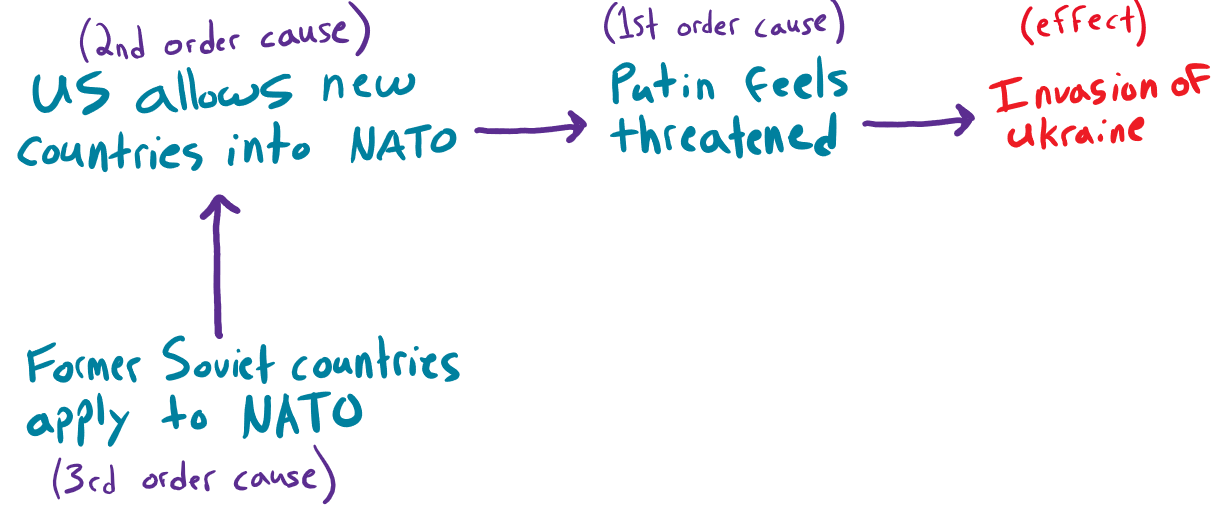
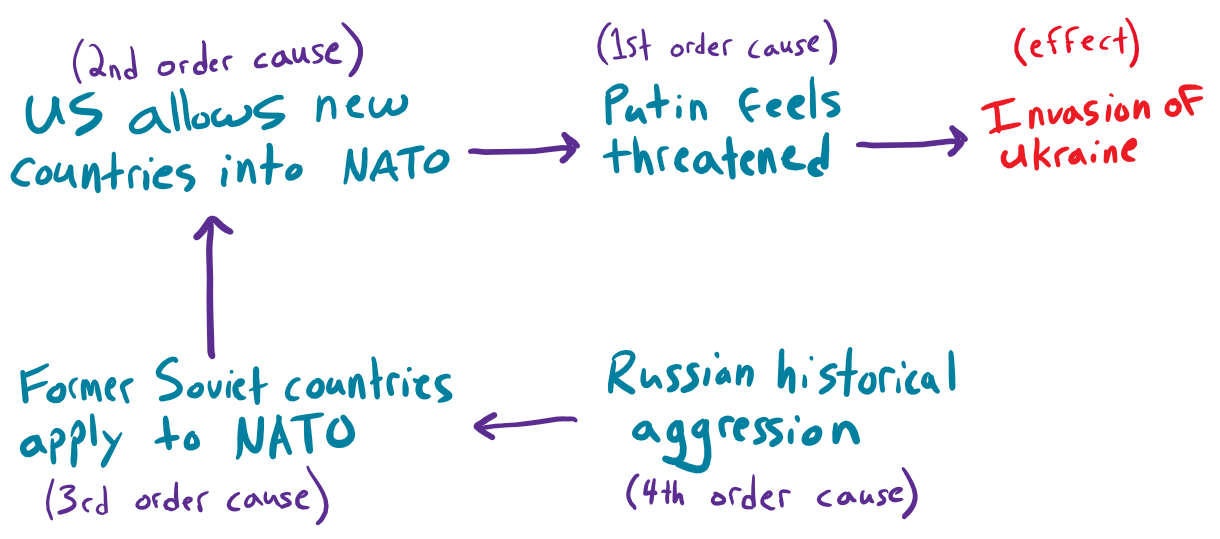
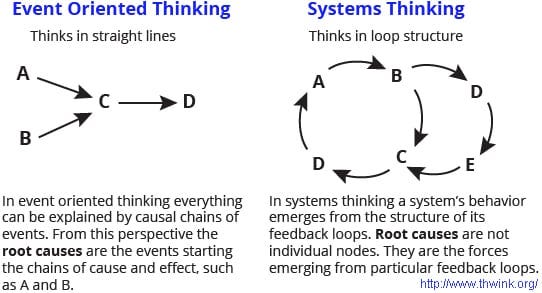
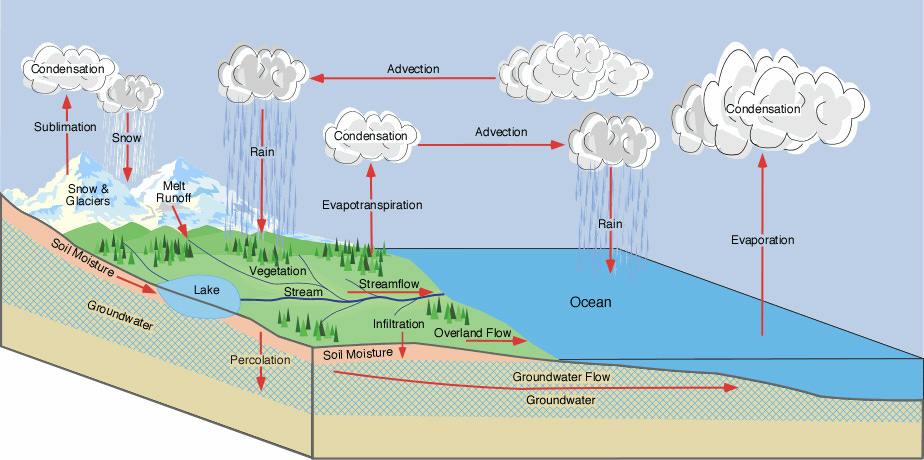
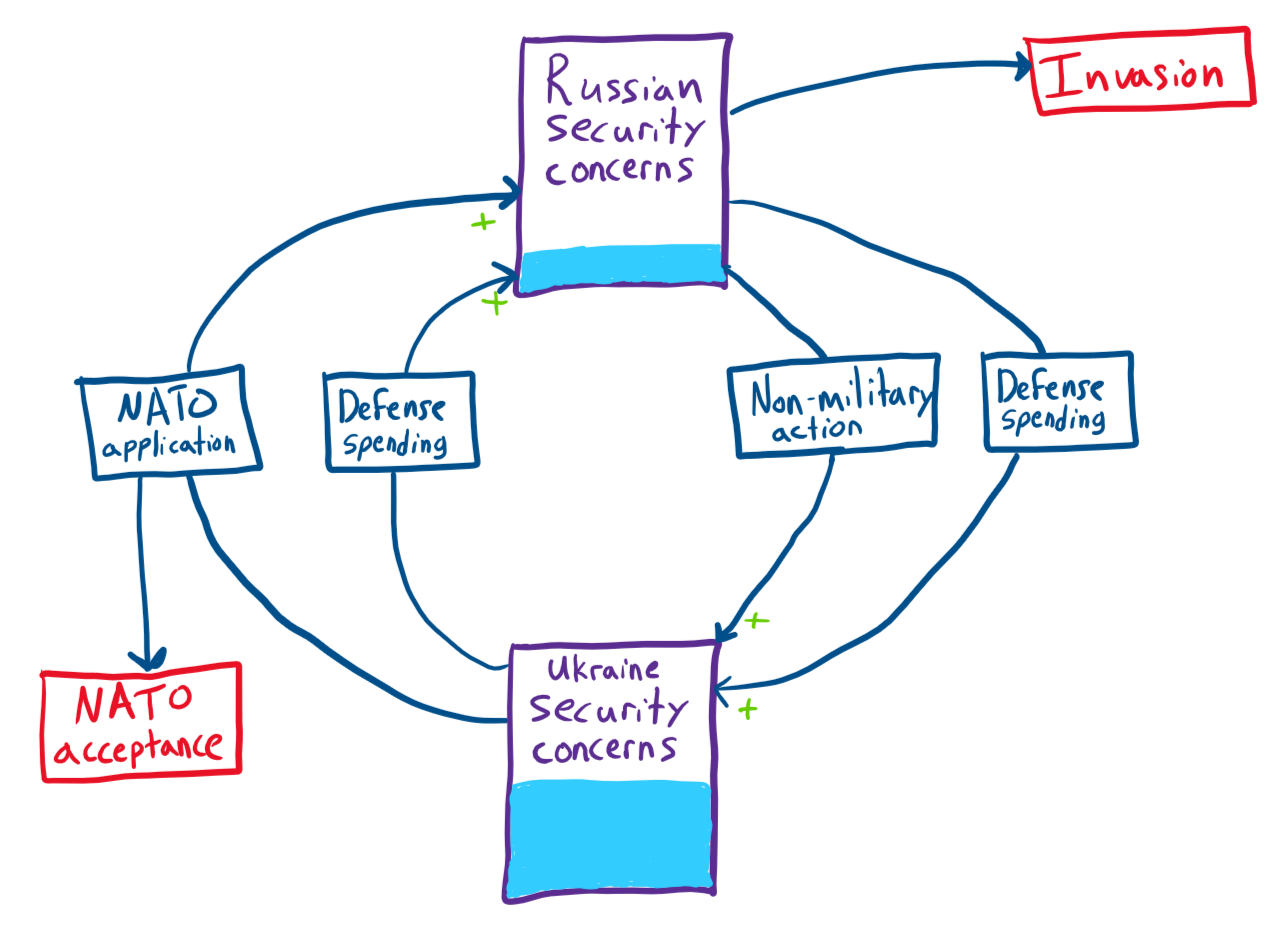
The systems thinking analogy to rain and weather really illustrates the point here. Well done! I love some relevant pics to break up an article